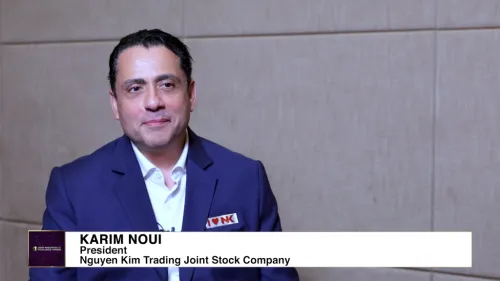
KPMG’s Guillaume Sachet believes now is the time to shift from recovery to resolve
The Customer Practice leader advocates more intelligent tools, human connections to address customers’ unique needs.
Guillaume Sachet is a Partner with KPMG in Singapore’s Advisory practice, where he heads the Customer Practice. Prior to this role, he has held leadership positions at multinational corporations where he created strategies for digital transformation and innovations in social media, marketing, telecom, media, and tech for clients across Southeast Asia.
Sachet built his digital and customer experience expertise over 25 years in the technology industry across the Asia Pacific region. Recognized as a thought leader, Sachet has written more than 15 articles and white papers on tech and innovation, and regularly keynotes events.
As a judge in this year’s Asian Experience Awards, Sachet discusses the key criteria in selecting the winners and shares his insights on how businesses can adopt a customer-centric position to grow and further improve the buyer experience.
Which particular markets or sectors are your main focus? Can you share with us your work experience or any backstory that has contributed to your professional career?
In my current role at KPMG in Singapore, I lead the customer practice for Singapore, providing business advice for sectors such as financial services, government, healthcare and life sciences as well as consumer and retail.
My past work experiences over 25 years have taken me across four continents where I worked in both strategy and technology. These include spearheading projects to drive digital transformation, corporate development, and innovation. I’ve also led strategic efforts at a traditional media company looking to reinvent itself as a digital player, where projects included setting up new digital platforms, and engaging with the start-up ecosystem to build greater agility into the organisation.
All these have culminated in rich experiences relating to understanding customer needs and customer engagement well. Being well aware of the potential out there makes me particularly psyched about new ways of reaching out to customers, as we work with companies closely to pivot their business models strategically to capitalise on emerging trends.
How can businesses make sure that everyone is involved in delivering a great customer experience and make it more unique and seamless?
Evolving consumer needs heightened by the effects of COVID-19 and rapid digitalisation have made it even more crucial for businesses to invest in delivering a unique and seamless customer experience. Beyond technology and business investments, new strategies and fresh takes to existing business models will need to be explored – and understandably, this means business leaders will need to actively drive change by stepping out of pure business recovery mode.
For instance, the pandemic has led to the growth of omnichannel retailing, where customers expect to browse, buy and get support for products and services across all channels. These digitally savvy customers demand a seamless experience regardless of what channel they choose. To cope with this, businesses should look at strengthening the connectedness of their organisation and aligning their capabilities. These include how they collect, analyse and share data insights across each part of the business. It also involves investing in more powerful and intelligent digital tools that can recognise each customer’s unique needs and tailor their offerings strategically.
Business leaders who respond positively to these changes will help set the tone and direction for the organisations, from employees in the front office who represent the brand in their interactions with customers as well as those in the middle and back offices.
Further to digitalisation, embedding a customer-centric mindset in the company’s DNA and culture should continue to be a priority. Whether online or offline, employees who are empowered to do what is needed to ensure customer satisfaction, can then make full use of their knowledge and skills to deliver on the brand promise.
What trends are you currently seeing amongst businesses in terms of how they connect with customers?
COVID-19 has clearly accelerated the digital transformation journey for many businesses, which have had to innovate and adapt quickly from offline to digital experiences. More are investing in digital methods of communications and payments, with digital trust and data security among top priorities. Alongside this, businesses are also shifting to place greater focus on purpose and empathy for digital interactions – which includes bonding and reconnecting with customers. For instance, businesses are increasingly relying on their online and social media platforms, as well as using livestreams, chatbots and mobile apps, to connect with customers.
Deep interactions are necessary particularly during a crisis where both physical and emotional distance may be felt, and customers are likely to be less brand loyal. Businesses that are able to demonstrate that they truly understand customers’ experiences and are willing to invest time and effort to make things right will enjoy greater social capital, which can help them differentiate their brand from cheaper alternatives out there.
In what ways can companies set themselves apart from their competition?
Today’s consumers are expecting more consistent, seamless and personalised experiences as they forge an emotional connection with the brand. In fact, personalisation was identified as one of the fundamental factors of excellent customer experience in KPMG’s 2020 Customer Experience Excellence Singapore Survey.
Personalisation is more than just recommending targeted advertisements or products. It is also about helping customers solve their problems in a smart and simple manner. As more consumers shift to online channels, companies can glean insights from purchase patterns, online interactions and user behaviour to provide a thoughtful take to customers’ enquiries online, thereby improving the customer experience even before any transactions take place.
Beyond that, companies that set themselves apart also demonstrate conscientiousness towards safeguarding data and governing its use. Particularly as more transactions move online, customers will look to brands that have robust policies and controls in place. Essentially, they’re looking for businesses that demonstrate a high level of integrity, with customers’ interests at heart.
What would be your advice to businesses that are still in the early stages of recovery?
The pandemic has compelled all businesses to experience the change associated with a disruption – except that it is not one of an innovative nature. Yet, similar to an innovative disruption, this means that consumer trends change and customers adopt new behaviours. Consequently, companies that fail to pivot their business models will experience some falling out.
Hence, businesses still in the early stages of recovery should not hold back on potential growth opportunities, even as they attempt to stabilise finances. With businesses worldwide all being affected by closures and border controls, it also opens up more opportunities for those that are looking to scale beyond their usual customer base or to arrive at new or additional distribution channels.
In fact, 96 per cent of Singapore CEOs predicted that their company’s earnings will increase in the next three years, according to the KPMG 2021 CEO Outlook Survey. Majority (72 per cent of Singapore CEOs) suggested an earnings outlook of up to 5 per cent per annum. 24 per cent of Singapore CEOs surveyed were relatively more bullish, suggesting an earnings outlook of 5 to 20 per cent per annum over the next three years, as compared to the global figure of 14 per cent of CEOs who felt the same way. This is a sharp contrast to 2020, where zero per cent of Singapore CEOs surveyed felt their company’s earnings could be higher than 5 per cent per annum.
That said, small and medium enterprises (SMEs) could still face some challenges in their recovery, as they would be more acutely impacted by issues such as a lack of manpower and rising costs. Hence, to plug this gap, there will be an urgent need to prioritise the training and development of employees. This could involve investing in the learning of future-ready skills and knowledge, such as automation and digitisation. Businesses that are steadfast in these efforts despite the challenging road ahead will find that this approach brings stronger payback in the longer term.
What key factors are you looking for when judging who should win?
The key things that I look out for when judging are: innovation, purpose and impact.
Innovation involves initiatives that create unique and compelling experiences for clients, customers, and employees. It requires being bold and forward-thinking and I want to see candidates demonstrate this restlessness to drive industry.
Purpose is about defending a cause or developing an initiative to address social, societal or economic issues. Today, the younger generation is looking at brands differently. They expect brands to think about ESG, diversity or equity. Commercial attractiveness is not good enough anymore.
And lastly, impact. I would be looking out for initiatives that have made a difference in their industry or company, which inspires others to do the same.
In essence, businesses that performed well in this competition are the ones with a pulse on key trends and who are able to successfully redefine the brand and customer experience to bring about positive change.


















 Advertise
Advertise







